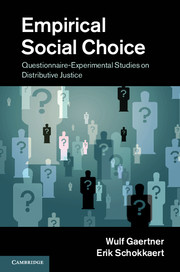6 - Further observations, views and final remarks
Published online by Cambridge University Press: 05 January 2012
Summary
At various instances throughout the book, we promised to come back to certain issues that we consider as fundamental for an understanding and appreciation of the role that empirical social choice can play between the poles of economic theory and political philosophy on the one side and positive (explanatory) social science research on the other. We first reflect on the quality of the information that can be obtained from questionnaire studies. We then discuss the theoretical relevance of the empirical results, especially in the light of the sometimes large degree of intertemporal and intercultural variation in the answers.
Are questionnaire studies informative?
Can questionnaire studies provide useful insights at all, if what is being looked at and statistically analysed are, for the most part, the responses of students to relatively simple questionnaires? It might be argued that these responses can be totally arbitrary since any answer could have been given, without any pecuniary consequence for the respondents. Answers could therefore be seen as merely cheap talk – in sharp contrast to most of the laboratory investigations in experimental game theory where money is at stake. Economists usually prefer the latter setup in which participants ‘have to put their money where their mouth is’. We have noted already, however, that it is not the aim of ‘empirical social choice’, as we see it, to predict behaviour. Empirical social choice is interested in eliciting values and individual or societal norms, in particular in relation to the issue of distributive justice, and this is something quite different. We will first argue that there is sufficient evidence supporting the view that the answers to the questionnaire studies are not arbitrary. We will then return to the relationship between questionnaires and experimental games.
- Type
- Chapter
- Information
- Empirical Social ChoiceQuestionnaire-Experimental Studies on Distributive Justice, pp. 187 - 200Publisher: Cambridge University PressPrint publication year: 2011



